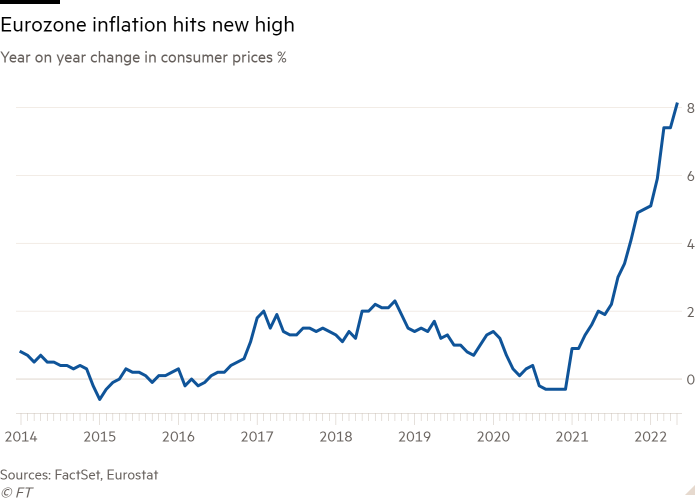European shares slipped and government bonds came under pressure on Tuesday after eurozone inflation data for May came in hotter than expected.
The regional Stoxx 600 stock index was down 0.5 per cent by the late morning, as was Germany’s Dax.
Intensifying questions about how far the European Central Bank will tighten monetary policy to curb price growth, fresh data showed that inflation in the region reached 8.1 per cent in May, up from 7.4 per cent in April and above economists’ expectations of 7.7 per cent.
Kasper Elmgreen, head of equities at Amundi, Europe’s largest asset manager, said: “The direction of travel from a number of data points shows inflation in Europe is surprising on the upside. We haven’t seen the peak yet. It’s something the European Central Bank will have to address.”
Ahead of the inflation data release, Philip Lane, chief economist of the European Central Bank, had said that quarter-percentage point interest rate rises in July and September would be the central bank’s “benchmark pace”. He noted in an interview with Spanish business newspaper Cinco Días that the process of withdrawing stimulus “should be gradual”.
In government debt markets, Germany’s 10-year Bund yield — seen as a proxy for borrowing costs across the eurozone — rose 0.04 percentage points to 1.08 per cent, extending a bout of selling pressure from the previous session after German inflation data also came in worse than expected.

US bonds were hit by heavier selling, with the yield on the 10-year Treasury note rising 0.08 percentage points to 2.83 per cent as the price of the benchmark instrument fell. Those moves followed the Memorial day holiday on Monday, when US equity and bond markets were closed, and ahead of a rare meeting between president Joe Biden and the chair of the Federal Reserve Jay Powell.
Wall Street stock futures edged lower, having snapped a seven-week streak of losses on Friday.
In commodities, Brent crude rose 1.6 per cent to $123.49 a barrel after the EU agreed a ban on most Russian oil imports. The international oil benchmark had climbed above $120 a barrel on Monday for the first time since March.
This provided further momentum for European oil stocks, with Shell, BP and Total Energies up 1.5, 1.3 and 1.3 per cent respectively. The energy weighted FTSE 100 was also the only major European index to rise, up 0.3 per cent.
“This is the story of the day,” said Elmgreen, “But the bigger picture is the Russian invasion of Ukraine put a significant risk premium on a range of commodities. In the long term agricultural commodities will join energy, with food price rises on the horizon.”
Elsewhere in equities, Hong Kong’s Hang Seng index gained 1.4 per cent, after data showed China’s manufacturing activity in May contracted at a slower pace than the previous month. An official manufacturing purchasing managers’ index rose to 49.6, up from 47.4 in April. Any reading below 50 signals a contraction.
Shanghai on Monday evening also announced a partial easing of some of its coronavirus lockdown restrictions.
The dollar index, which measures the currency against six others, traded flat, while the euro and the pound fell 0.5 per cent and 0.3 per cent respectively against the US currency.

